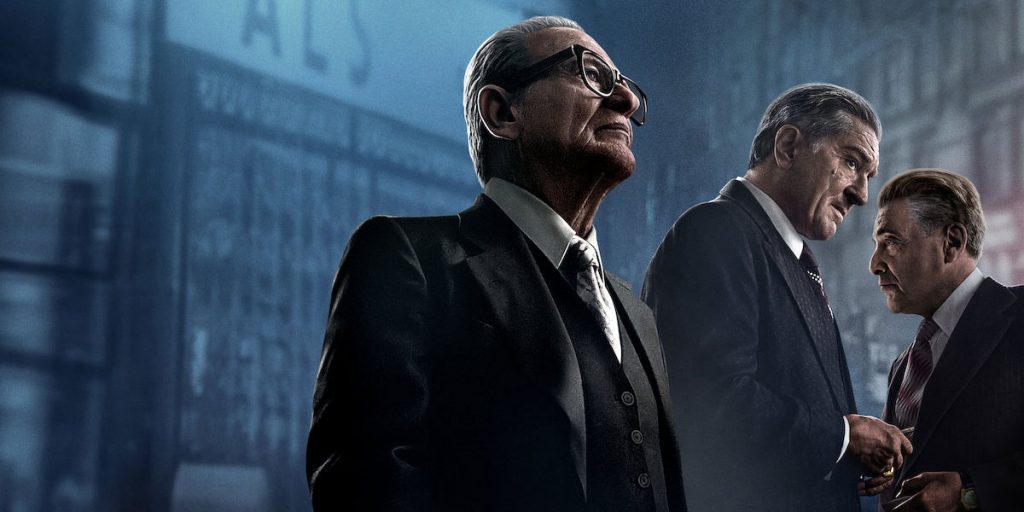The Irishman is a lyrical reflection on love, values, and time passing. Scorsese takes you to Mafia Fairyland, where all your old friends are waiting for you.
Pleasure is heightened through repetition, and Martin Scorsese’s filmography gives cinematic proof of that. He has been nurturing us with our daily dose of drugs (sometimes), rock ‘n roll (how about the Stones’ glamorously sexy Can’t you Hear me Knocking in Casino’s opening sequence), and gunfights – lascivious enough to cover for the rather unpredictable abstinence from voyeuristic sexual matters – for way more than a decade now, but it seems our measure is not quite full yet. Scorsese really is the good guy conniving with the baddies for mysterious reasons, a good guy which strives hard not to lose his balance to more obscure forces in the drab of everyday life. Nevertheless, his films come across with an aura of unleashed wilderness. We know the trick, but we always fall for it.
Maybe that’s why Netflix produced Scorsese’s latest release, The Irishman; or it might as well be the contrary, Scorsese trying to impose himself on the streaming platform to be able to make a film which is almost impossible to watch without blinking your eyes at least a couple of times throughout. The Irishman is 3 ½ hours long, and you definitely don’t want to watch it as easy entertainment for a hard day’s night. Time is a serious thing for a platform that specialises in TV series. But so is the case for good old Marty, apparently.
Scorsese’s all-American anti-heroes have never been great at disposing of their time in the best of ways. From Travis Bickle (Robert De Niro) to Jimmy Conway (Robert De Niro) and Billy Costigan (Leonardo Di Caprio – still an Italian surname), every single one of Scorsese’s male characters seems to be rushing through life in a masochistic impulse to bargain his life for glorious deaths, growing rather disillusioned by the time the ride ends. So, unsurprisingly enough, time is a big thing for Frank Sheeran (guess who?) and all his acolytes as well, and not only because De Niro gets his face rejuvenated in order to be able to play an older and a younger version of his Frank character.

In fact, Frank is the last man standing of an Irish-Italian mob operating between the ‘60s and the ‘80s in the Philadelphia area. A meek enough man, Frank acts as the peacemaker of the group, trying to keep matters from falling apart between a raging Al Pacino and a scheming Joe Pesci. To do so, he devotes his life to “The Family”, thus neglecting his natural one, that is to say, his wife Irene (Stephanie Kurtzuba – not Italian; she only plays a minor role in the film) and his four daughters. Growing old and lonely, Frank will end up in a home for elderly people, telling Scorsese’s camera the story of his life with nothing more to do than…wait.
That’s where The Irishman starts. And that’s when we are plunged into a never-ending chain of all too Scorsesish musically driven flashbacks and gracefully sweeping camera movements. That’s when we feel the director’s unconditional love for the art of cinema – and as a consequence we start picking up random clues to make everything we see fit into Scorsese’s filmography – and that’s when we realise that yes, we have already seen it all. But not quite.
Because there’s a fundamental difference between The Irishman and everything Scorsese directed before. And that difference lies in the final 30 minutes of the film, where De Niro stars solo in a wheeling chair, taking every step that’s needed to prepare to a smooth last departure. The hero never survived himself before, and now that he’s at the end of the line he can’t do anything but dissonate with both his present and his past. As T.S. Eliot would have it: “That’s not what I meant. That’s not what I meant at all”.
Nevertheless, this is not the point of the movie. On the contrary, The Irishman could not have existed without all the things that could have belonged to [insert Scorsese’s film of choice]. If there’s a solution, it all lies in the path we take, not in the room we land into. So yes, every minute of The Irishman was worth it. And yes, I believe it was meant for Netflix rather than for cinemas. You’ll see that the film holds nicely if you separate it into four three-quarter-of-an-hour parts and a final 30 minutes. Could this be a case? For sure it is. We all know Marty is quite, quite reactionary when it comes to what he understands as cinema. Yet we can’t help but notice that The Irishman closely resembles a Naturalist saga à la Zola. So maybe we should just enjoy that in episodes. Just like every cultured 19th century reader would have done.
The Irishman is now available to stream on Netflix.

